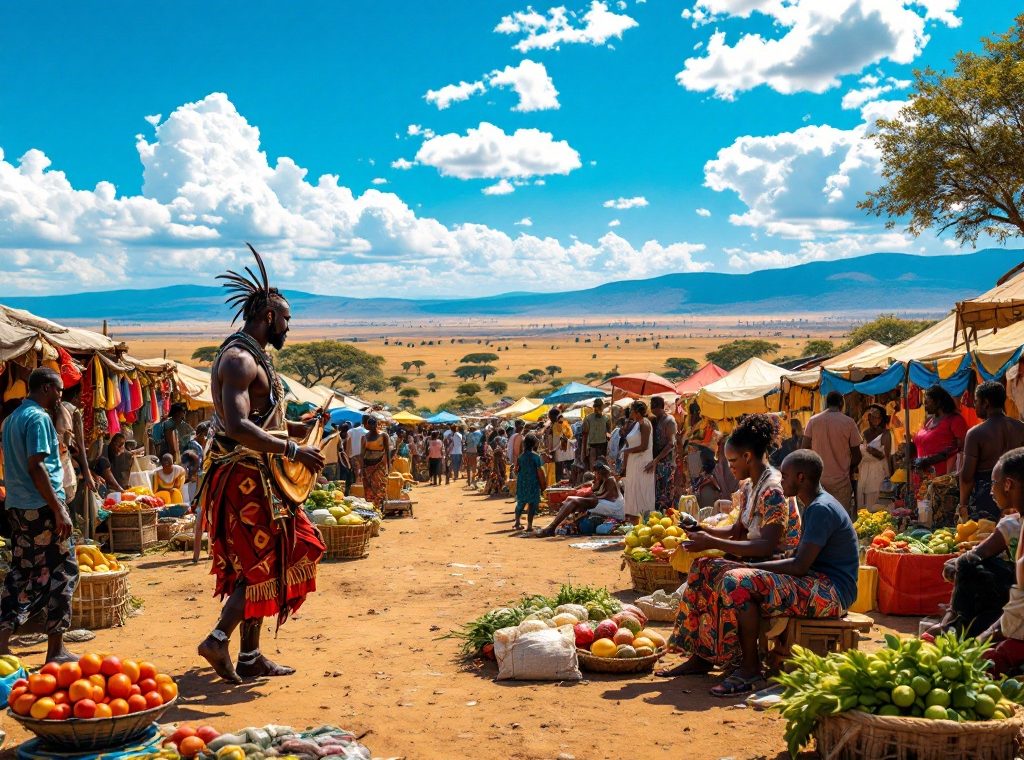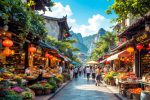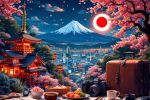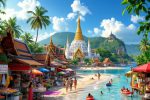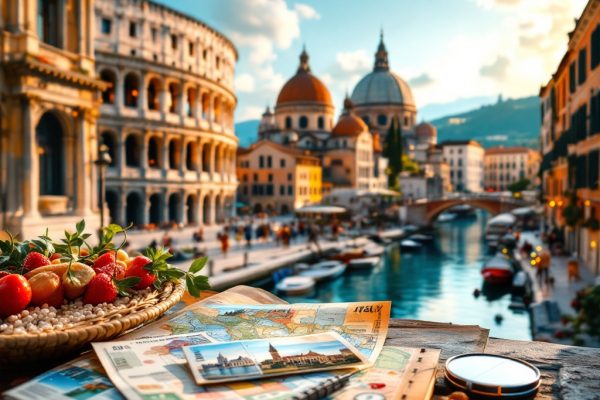African Culture Insights: How to Write a Travel Guide to Kenya
Discover the magic of Kenya, a land of vibrant cultures, breathtaking landscapes, and warm hospitality. Explore the traditions of over 40 ethnic groups, from the Maasai warrior dances to the Luo tribe’s enchanting nyatiti lyre music. Immerse yourself in the rich tapestry of Kenyan life, from bustling markets to serene savannas. Learn essential travel tips, including visa requirements and cultural etiquette, to ensure a smooth and enriching journey. Uncover the wonders of Kenya – start your adventure today!
Important information
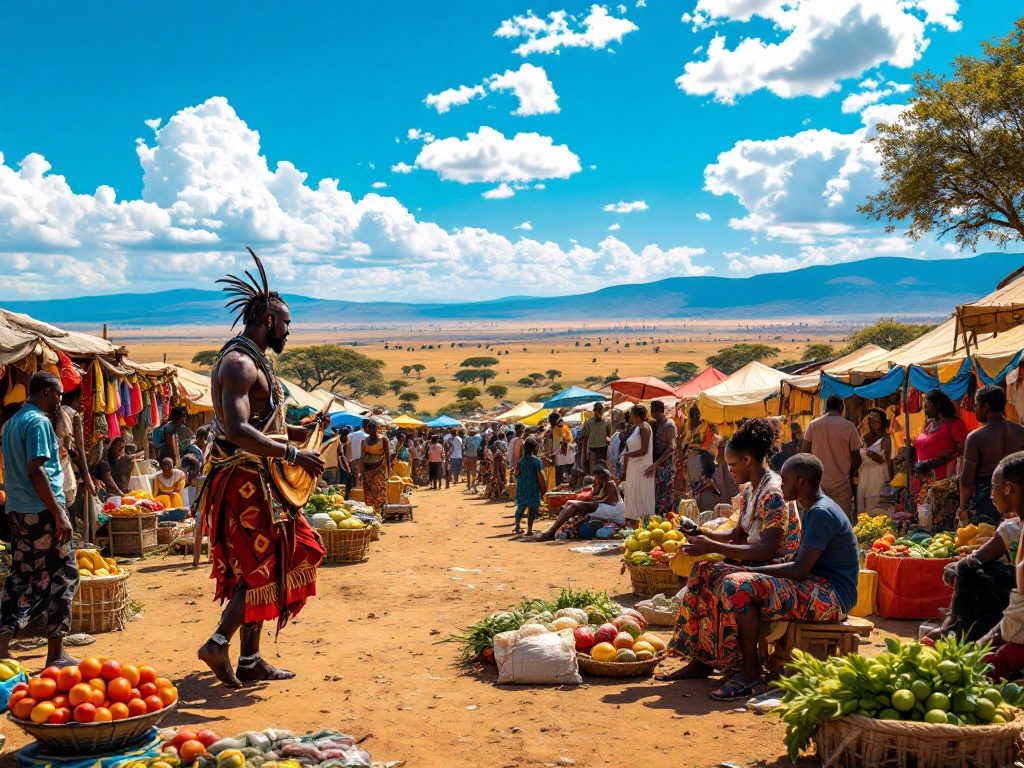
- Kenya has a rich cultural heritage shaped by over 40 different ethnic groups, including the Maasai, Kikuyu, Luo, and Samburu, each with unique traditions.
- Swahili and English are the official languages, but over 60 languages are spoken throughout the country.
- Key cultural experiences include visiting Maasai villages, attending festivals like the Lamu Cultural Festival or Maasai Mara Festival, and enjoying traditional cuisine (ugali, sukuma wiki, nyama choma).
- Travelers should consult their embassy for visa requirements and get recommended vaccinations. Packing essentials include light clothing, insect repellent, sunscreen, and comfortable shoes.
- Respecting local customs is important. Dress modestly, ask permission before taking photos, and be mindful of cultural etiquette.
Understanding Kenya’s Cultural Diversity
Kenya boasts a vibrant cultural landscape, shaped by over 40 distinct ethnic groups. Each group contributes unique traditions and customs, weaving a rich tapestry of Kenyan identity. Some of the most prominent groups include: the Maasai, known for their warrior culture and intricate beadwork; the Kikuyu, celebrated for their agricultural traditions and captivating storytelling; the Luo, renowned for their musical heritage, especially the nyatiti lyre; and the Samburu, sharing Maasai ancestry, who also practice elaborate beadwork and maintain a semi-nomadic lifestyle. Many other groups further enrich this diverse cultural mosaic, making Kenya a truly remarkable destination.
Exploring Kenya’s Ethnic Tapestry
Kenya is a vibrant tapestry of diverse cultures, with over 40 ethnic groups contributing to its rich heritage. Among the most prominent are: the Kikuyu, renowned farmers and storytellers; the Maasai, known for their warrior traditions and semi-nomadic lifestyle, captivating audiences with their energetic dances; the Luo, who enrich Kenya’s musical landscape with the melodic nyatiti lyre along the shores of Lake Victoria; the Samburu, relatives of the Maasai, expressing their artistry through intricate beadwork; the athletic Kalenjin, celebrated for their running prowess; and the Turkana, skilled artisans crafting unique treasures. These varied traditions interweave, creating a nation bursting with cultural richness.
Languages of Kenya: Over 60 Spoken Languages
Kenya’s cultural richness shines through its linguistic diversity. With over 60 languages spoken across the nation, including the official languages of Swahili and English, a vibrant tapestry of communication exists. This multitude of tongues enhances interactions and fosters cultural exchange, ultimately strengthening Kenya’s national identity.
Language and Communication
Swahili is Kenya’s national language, uniting people throughout the country. It’s integral to daily life for most Kenyans, playing a vital role in communication and cultural expression.
The Role of Swahili
In Kenya, Swahili serves as a unifying force, bridging communication gaps between diverse communities and fostering social harmony among various ethnic groups. This shared language promotes understanding and strengthens national identity.
Tribal Traditions
The Kikuyu people, deeply connected to their land, value both farming and the art of storytelling.
The Luo boast a rich musical heritage, featuring the beautiful nyatiti lyre.
The Maasai, known for their proud warrior traditions, express their power through vibrant dances.
The Samburu’s remarkable craftsmanship shines through their intricate beadwork.
Kikuyu Tribe: Agricultural Traditions and Storytelling
The Kikuyu, Kenya’s largest ethnic group, are celebrated for their agricultural expertise, cultivating a variety of crops, including yams, bananas, and maize. Their rich storytelling tradition complements this agricultural heritage, preserving their history and values through engaging spoken narratives and folklore. This practice ensures the preservation of their past and strengthens their cultural identity.
Maasai Tribe: Warrior Culture and Traditional Dance
The Maasai, known for their warrior traditions and vibrant dances, celebrate a young warrior’s coming-of-age with the Adumu, or “jumping dance.” This energetic ritual is a crucial element of their heritage. Their distinctive red shukas and intricate beadwork are powerful symbols of Maasai identity. Across the East African plains, these semi-nomadic people roam with their cattle, a lifestyle deeply intertwined with their culture.
Luo Tribe: The Musical Heritage of Nyatiti
The Luo tribe has a rich musical tradition, especially their famous playing of the nyatiti, a type of lyre. This instrument is very important in Luo culture.
Samburu Tribe: Mastery in Intricate Beadwork
The Samburu, similar to the Maasai, are renowned for their intricate beadwork, a vital aspect of their cultural heritage.
Traditional Arts and Crafts
Kenyan art vibrantly weaves together diverse cultural influences. Maasai and Samburu beadwork uses intricate designs to express social status and identity, creating stunning visual pieces. Woodcarving also flourishes, with the Akamba and Kikuyu skillfully crafting animals, spirits, and scenes from everyday life. These skills, passed down through generations, preserve Kenya’s rich heritage while providing economic opportunities for local artisans. These crafts are more than art; they narrate the story of Kenya.
Beadwork and Jewelry
Kenyan tribes, such as the Samburu and Maasai, are renowned for their intricate beadwork. The symbolic colors and patterns woven into these designs represent various aspects of their lives, including marital status, age, and social standing. Adornments like necklaces, bracelets, and earrings are not merely beautiful; they serve as powerful expressions of their rich cultural heritage.
Woodcarvings and Sculptures
Kenyan woodcarvings are a vibrant tradition, often depicting animals, ancestors, and deities. This art form is especially prominent among the Kamba, Makonde, and Mijikenda tribes, each possessing a rich artistic heritage. Their skills have been honed and passed down through generations. The carvings embody profound cultural meaning, reflecting stories and beliefs central to their communities.
Music and Dance
Music and dance are integral to Kenyan culture, narrating the unique stories of its diverse people. These art forms are vital components of ceremonies, rituals, and social gatherings, showcasing Kenya’s rich heritage. Music and dance frequently intertwine, with the music guiding and inspiring the dancers’ movements. Through rhythmic beats and vibrant melodies, these art forms powerfully communicate, preserving Kenyan culture and history. Dances often depict historical events or community values, while traditional instruments enrich the musical expression. In Kenya, music and dance transcend mere entertainment; they are living embodiments of the nation’s vibrant cultural identity.
The Significance of Traditional Instruments
Kenyan culture is deeply intertwined with traditional instruments, which play a vital role in ceremonies, rituals, and celebrations. For instance, the nyatiti lyre is central to the Luo tribe’s musical traditions. Drums and flutes also feature prominently, contributing significantly to the rich tapestry of tribal customs. Through music, these instruments transmit cultural knowledge and preserve history, ensuring that the past resonates in the present.
Festivals and Celebrations
Kenya’s festivals vibrantly express its cultural heritage, bringing communities together through music, dance, and time-honored traditions. Experience the unique tapestry of Kenyan culture through these festivals:
Lamu Cultural Festival
This festival showcases the island’s Swahili heritage, featuring exciting dhow races and captivating musical performances.
Maasai Mara Festival
This festival offers a unique window into Maasai life, with traditional ceremonies, art displays, and celebratory dances.
Nairobi International Film Festival
This festival attracts filmmakers and cinephiles from around the globe.
Each festival offers a special opportunity to connect with local culture and experience Kenya’s rich traditions.
Maasai Mara Festival
The Maasai Mara Festival celebrates the vibrant culture of the Maasai people with exciting performances and encourages community involvement. Visitors can also witness the spectacular wildebeest migration, which coincides with the festival.
Lamu Cultural Festival
Experience the vibrant Swahili culture at the Lamu Cultural Festival on Lamu Island, Kenya. This dazzling event showcases captivating music and dance performances, thrilling dhow races, and delectable traditional cuisine. It’s a true celebration of Kenya’s unique coastal heritage.
Cuisine and Culinary Experiences
Kenyan cuisine is a vibrant fusion of African, Arab, and Indian flavors. Staples like ugali (cornmeal porridge) and sukuma wiki (collard greens) are common everyday fare. Celebrations often feature nyama choma, flavorful grilled meat. Along the coast, Swahili cuisine, infused with Arab and Indian spices, offers rich stews and aromatic rice dishes. Further exploration reveals regional specialties and delicious street food. Visiting local markets or taking a food tour provides a deeper understanding of Kenya’s diverse culinary heritage.
A Blend of African, Arab, and Indian Influences
Kenyan cuisine is a delightful fusion of African, Arab, and Indian influences. Coastal dishes are often infused with aromatic Arab and Indian spices, a legacy of the region’s vibrant trading past. Further inland, traditional Kenyan meals showcase local ingredients. Staples like ugali (maize flour porridge), sukuma wiki (collard greens), and the ever-popular nyama choma (grilled meat) take center stage. This diverse culinary landscape offers visitors a delicious glimpse into Kenya’s rich history and cultural heritage.
Popular Dishes: Ugali, Sukuma Wiki, and Nyama Choma
Kenyan cuisine offers a delicious and balanced meal centered around several staple dishes. Ugali, a thick porridge made from maize flour, provides essential carbohydrates. It is often paired with sukuma wiki, a flavorful collard green dish similar to kale. For protein, nyama choma, grilled goat or beef, is a popular choice, especially for social gatherings. These dishes are deeply rooted in Kenyan traditions, reflecting the country’s agricultural heritage and communal dining customs.
Cultural Enrichment and Immersive Experiences
Immerse yourself in Kenya’s vibrant culture. Visiting a Maasai village offers a unique experience, from their distinctive attire to their energetic dances. A traditional cooking class unveils the secrets of Kenyan cuisine and culinary practices passed down through generations. Exploring local crafts, such as beadwork, enriches the experience further. You’ll discover artistic traditions and understand their contribution to the local economy, offering a fascinating glimpse into Kenyan life.
Engaging with Local Communities
Experience the rich culture of Kenya by engaging with local communities. Participate in community tours, vibrant festivals, or hands-on craft workshops. Learn traditional skills such as bead making or pottery. Volunteering provides a rewarding opportunity to contribute while experiencing local customs firsthand. Respectful interactions are key to building genuine connections; learning basic Swahili phrases can enhance your experience. You’ll meet Kenyans from diverse backgrounds and gain a deeper understanding of the country’s cultural tapestry. By respecting local traditions, you’ll create lasting travel memories.
Maasai Village Experience
Experience the vibrant culture of a Maasai village with a day of immersive exploration. Interact with Maasai warriors and women, learning about their rich traditions firsthand. It’s an unforgettable cultural immersion.
Travel Preparation and Tips
Traveling to Kenya? Here’s what you need to know:
Visa & Health
Visa requirements depend on your nationality. Some nationalities can obtain a visa upon arrival, while others must apply beforehand. Consult your embassy or consulate for specific requirements, or check online resources for the latest information. For your health, recommended vaccinations include yellow fever and typhoid, in addition to routine immunizations. It is highly recommended to consult your doctor or a travel clinic for personalized advice.
What to Pack
Pack light clothing suitable for warm days and cooler evenings. Essential items include insect repellent, sunscreen, a hat, and comfortable walking shoes. Don’t forget any necessary medications and a small first-aid kit. Consider packing a reusable water bottle to stay hydrated.
Getting Around
Kenya offers various transportation options, including domestic flights, buses, matatus (minibuses), and taxis. For greater flexibility, especially for exploring national parks and more remote areas, consider renting a car. Be sure to have the necessary international driving permit and familiarize yourself with local driving conditions.
Safety & Insurance
Prioritize your safety by avoiding walking alone at night, especially in less populated areas. Safeguard your belongings and be aware of your surroundings. Travel insurance is strongly advised to cover any unforeseen circumstances, such as medical emergencies or lost luggage.
Visa Requirements and Immunizations
Kenyan visa requirements vary by nationality, so it’s best to contact your local Kenyan embassy or consulate for specific details. Recommended vaccinations include yellow fever and typhoid. You should also ensure your routine immunizations, like measles, mumps, and rubella, are current. For personalized recommendations, consult your doctor or a travel health specialist.
Packing Essentials
Pack light clothing for warm days and your swimwear for a refreshing dip. For the chilly evenings in the highlands, a light sweater or jacket is recommended. Sunscreen, sunglasses, and a hat are essential for sun protection.
Insect repellent is crucial, particularly for game parks and coastal regions. Remember your toiletries and any personal medications. Pack a camera to capture the memories, and a universal adapter to keep your electronics charged. Comfortable walking shoes are a must for exploring.
Transportation Options
Kenya offers diverse travel options. For exploring at your own pace, consider renting a car. Public transport, including local buses and matatus (minivans), is readily available. Guided tours provide valuable cultural insights, enriching your Kenyan experience.
Safety and Health
Consult your doctor about recommended vaccinations and malaria prevention.
Pack a well-stocked first-aid kit for minor medical issues.
Safe food and water practices are vital. Stick to bottled water and dine at established restaurants.
Shield yourself from the sun with sunscreen, sunglasses, and a hat.
Stay alert to your surroundings, particularly in crowded areas, to avoid petty theft.
Consider travel insurance for unexpected events.
Respect local laws and customs, and observe wildlife from a safe distance.
Research any specific safety concerns or health risks associated with your destination.
Practical Travel Tips
Respecting local customs is essential when visiting Kenya. Dress modestly, particularly in religious sites or rural areas, and avoid public displays of affection. Always ask permission before taking photos of individuals. Bargaining is a common practice in local markets, but do so respectfully.For convenient and affordable communication during your stay, consider purchasing a local SIM card upon arrival. Most mobile providers offer data bundles tailored to your needs. Your passport will be required for registration.Kenya is famous for its exceptional tea and coffee. Treat yourself to “chai,” a popular spiced tea with milk and sugar. Kenyan coffee thrives in the highlands, and participating in a traditional tea or coffee ceremony offers a unique cultural immersion.
Dos and Don’ts of Kenyan Culture
Respecting local customs is crucial when visiting Kenya. A warm handshake is the customary greeting, and addressing people as “sir” or “madam” shows respect. Modest clothing is appreciated, particularly in religious places or the countryside. Always seek permission before photographing people or their belongings, and be mindful of personal space.
Kenyan Etiquette
Kenyans value community and tradition. Avoid public displays of affection and refrain from discussing sensitive subjects like politics or religion. Respect local beliefs and protect the environment by not littering.
Financial Interactions
Avoid casually offering money; payment should always be for goods or services rendered. Tipping for good service is perfectly acceptable, but giving money without a clear reason can be misinterpreted.
By observing these customs, you’ll enrich your Kenyan experience.
Obtaining a Local SIM Card
Local SIM cards from providers like Safaricom, Airtel, and Telkom are readily available. You can purchase one at official stores or from authorized agents at airports such as Jomo Kenyatta (NBO) or Moi (MBA). Remember to bring your passport for registration.
Kenyan Tea and Coffee Culture
Kenya is renowned for its exceptional tea and coffee. A leading global exporter, the country is especially known for its black tea. Kenyan Arabica coffee, prized for its rich flavor, is another important crop. More than mere commodities, these beverages are deeply ingrained in Kenyan culture. Many locals start their day with a cup of tea or coffee, and offering these drinks is a common sign of hospitality. Tourists can also explore the plantations to discover the cultivation process and cultural significance of these crops. Both tea and coffee play a vital role in Kenya’s economy and national identity.

